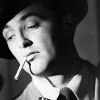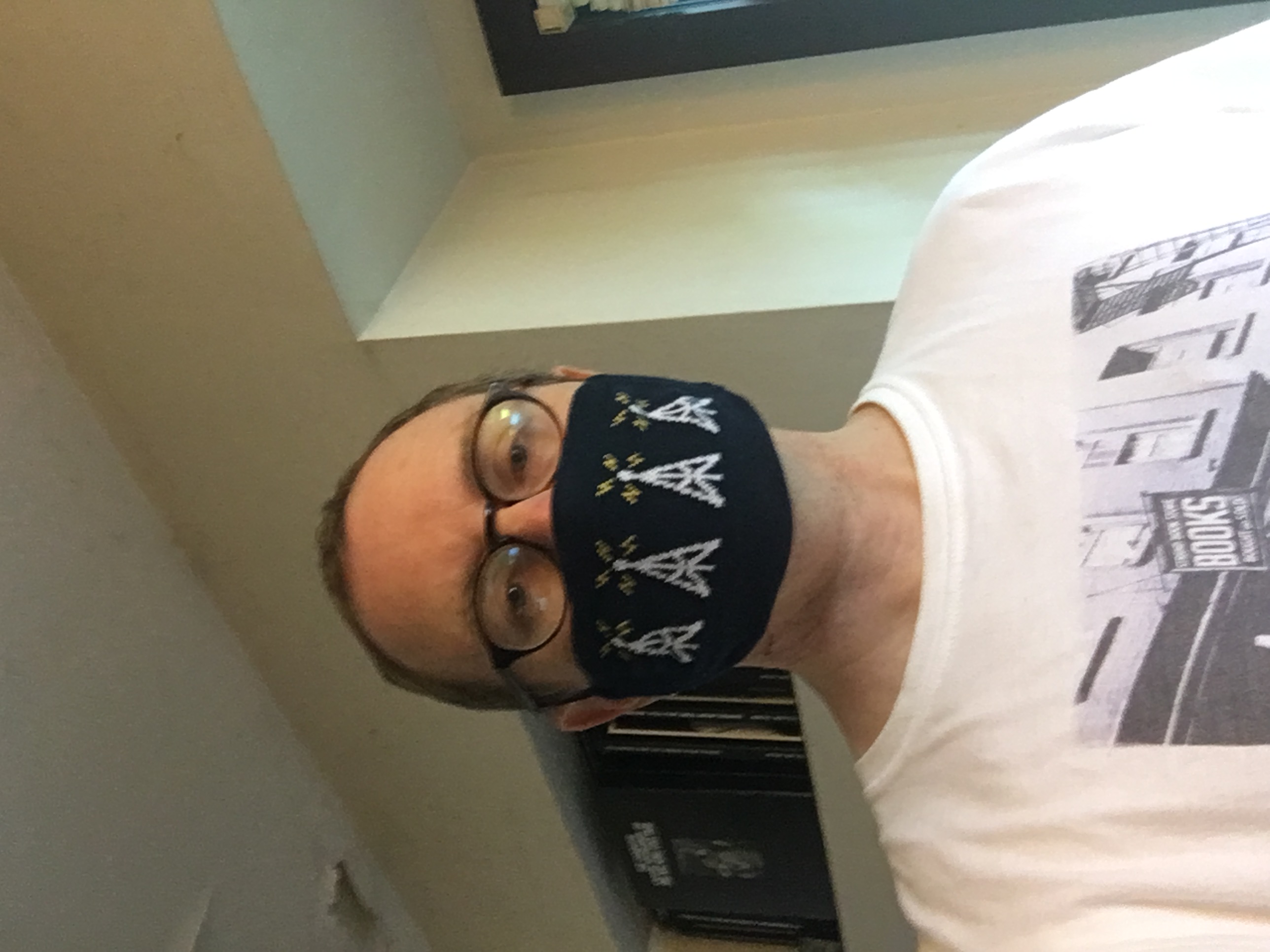-
Posts
18,093 -
Joined
-
Last visited
-
Days Won
2
Content Type
Profiles
Forums
Events
Blogs
Everything posted by ghost of miles
-
Circa 1964-65, not sure of exact dates.
-
This collection mentions several. I just checked John Szwed's Sun Ra bio, and page 204-205 contains this passage about Gilmore and Blakey: As some of the musicians began to get a taste of the opportunities New York offered they began to feel restless and ignored. Rehearsals were not enough. John Gilmore spent hours every day practicing, then going out at night to hear lesser saxophonists making money: "I'd been walking around New York and I wasn't working anywhere, and half the cats were out there playing my ideas," he told DownBeat. "I said, 'What is this? Here I am not working, and they're working, and they're stealing my ideas." When Lee Morgan recommended him to Art Blakey as the Jazz Messengers were leaving for a tour of Japan and Europe, he accepted the offer and left the Arkestra. But his bitterness even carried over into the Blakey band, and annoyed Blakey to the point where he let him go: I criticized him because he'd be talking the way he was thinking. The way he thought about life and what he believed in and why he would put down other people. I didn't think it was right. He was young and running off the top of his head, don't tell me that Lester Young steals from him, or Coltrane steals from him--that's not true. He's off... I wasn't concerned about his playing, he'd be telling me about his fans on Mars or Jupiter, but I said it's the fans on this planet we're concerned with, not back there. The Blakey quote is from a July 1981 Cadence interview. Szwed doesn't specify when the DownBeat article with the Gilmore quote appeared.
-
Here’s an early Night Lights show that I did: Away From The Spaceways: John Gilmore It focuses on his few Ra-less dates, many of which have been mentioned above.
-
I saw Ethan Iverson’s retweet of this earlier today. This is an excellent list, Mark—thanks so much for putting it together.
-
Excited to be reading the final volume in Rick Perlstein’s rise-of-modern-conservatism saga:
-

"Rollins '57: Sonny Rollins Takes the Lead"
ghost of miles replied to ghost of miles's topic in Jazz Radio & Podcasts
Birthday salutations to Mr. Rollins today on the occasion of his 90th. We re-aired Rollins ‘57: Sonny Rollins Takes The Lead this past week in honor of his impending milestone, and it remains archived for online listening. -
I think so, yes. There’s some overlap with the 1969 live albums released in the early 1970s as well. I highly recommend the Complete Matrix Tapes set to anybody who’s a Velvets fan. They’re locked in and there’s a lot of creative interpretation and variance in their approach to the songs. A great live rock ‘n roll band.
-
That website is an ongoing hoax in and of itself. I really wish it could be blitzed off the Internet.
-
What's the source for the report being false or a hoax, which Annette Peacock is tweeting as well? Hopefully not mediamass.net. (And hopefully he's still with us--seems odd that Jack DeJohnette would be taken in, though.) EDIT: I don't see any tweet about Gary Peacock on DeJohnette's recent Twitter feed--so if it was posted there originally, he's deleted it.
-
I just featured this album on my Tuesday afternoon show.
-
Definitely, I understand it's not to most listeners' taste--that's one reason why Dan Marx and the Savoy reissue producers opted to cut out a lot of it from the 1998 set. I'm glad to have both versions but always recommend the 1998 collection to anybody interested in live Parker from this period. And thanks for the hat-tip on the Swan Records release... I figured there were some stray Roost broadcasts out there that didn't fall under the umbrella of the Savoy-owned material.
-

Thelonious Monk - Palo Alto (Impulse) --> fresh new monk!
ghost of miles replied to EKE BBB's topic in New Releases
The Amazon link that I posted today includes a listing for a vinyl edition, so I think you're in luck! -
Not meaning to diss your John S. Wilson record guides! I just recall glancing through them at IU’s music library to see what he had to say about a couple of artists/albums for a show I was working on (and for which contemporaneous accounts/reviews were scant). Later writers such as Max Harrison have spoiled me, no doubt. And yes, I definitely get the interest of in-the-historical-moment perceptions and accounts (that’s why John Gunther’s Inside U.S.A. piqued my curiosity, as a portrait of the country in the immediate aftermath of World War II). And I confess to having less knowledge than I should of pre-1970 jazz record guides, so not aware of others that might have been circulating in the late 1950s.
-
This one? It’s a great set, with excellent notes by Loren Schoenberg. Dan Marx at Savoy told me they opted to clip out a lot of Sid’s banter, the commercials, and the bop vocalese tracks, and to include the 1947 Carnegie Hall recordings with Diz and the Chicago 1950 date instead. Which, musically speaking, was a good choice. But I also ended up hunting down the rest of the prior 1980s Savoy “Bird At The Roost” CDs, in part because I was making a long nightly work commute at the time and enjoyed hearing the flow of the entire broadcasts. Sometimes it’s cool to hear the music in its original context—Symphony Sid noting celebrities in the audience, etc. I don’t know, though, if there’s a collection of the 1948-49 Parker Roost broadcasts that includes even more material than was issued on the four late-1980s Savoy volumes.
-
Per Larry’s “Liner Note Bingo” topic, via the Tristano/Konitz/Marsh Mosaic set:
-
Are you looking for the late 1980s Savoy CDs, which include all of the Symphony Sid chatter and plugs and some bop vocalese that was left off the later Savoy set? Unless there are boots out there with added material, I think the four individual late-80s CDs are the most comprehensive gathering of those broadcasts. I don’t wish to sell mine but will keep an eye out at my local record store, where I’ve seen them turn up used sometimes. It’s also quite possible that they’ve been rebundled in their entirety at some point by an Andorran outfit (to use some very old-school Organissimo parlance).
-
Speaking of George Coleman... a live 1971 recording from the Left Bank (with Albert Dailey on piano!) coming our way later this year, according to Zev Feldman’s Facebook page: GEORGE COLEMAN on REEL TO REAL for RSD BLACK FRIDAY! I'm happy to announce that my archival jazz cohort Cory Weeds and I are back with another previously-unissued discovery coming for Record Store Day Black Friday Nov 27 (CD/Digital Dec 11). The George Coleman Quintet "In Baltimore" was captured live at the Famous Ballroom on May 23, 1971, presented by the Left Bank Jazz Society, and featured a stellar band with trumpeter Danny Moore, pianist Albert Dailey, bassist Larry Ridley and drummer Harold White. The limited-edition 180g LP includes an elaborate insert with beautiful photos by Francis Wolff, intros by Cory and I, a main overview essay by the great jazz historian/archivist (and producing mentor to me) Michael Cuscuna, plus interviews with "the Big G" himself George Coleman, John Fowler from the Left Bank, and the self-described Colelman disciple, tenor man Eric Alexander. Audio restoration direct from the original tapes by Chris Gestrin, LP mastering by Kevin Gray at Cohearent Audio, LLC, and pressed at Standard Vinyl in Toronto. This marks the 2nd RTR release from the Left Bank archives, the first being Etta Jones "A Soulful Sunday" featuring the Cedar Walton Trio, and it's especially significant because it's also the first known recording of George Coleman as a leader (a good six years before his first studio album as a leader from 1977). As Michael Cuscuna says, "This concert is a rare early glimpse at George Coleman in charge and, as always, playing magnificently.” I want to thank Cory, first and foremost, for all his hard work and passion bringing this project into fruition. A big thanks also to my friend John Fowler who oversees the Left Bank Jazz Society tape archives. These releases also wouldn't be possible without the support of Michael Kurtz and Carrie Colliton at Record Store Day. And last, but not least, thanks to the archival design guru John Sellards, for creating yet another gorgeous cover and package that's sure to have jazz fans transfixed for years to come. For media inquiries, please contact: DL Media · 267-541-2784 Maureen McFadden · maureen@dlmediamusic.com Don Lucoff · don@dlmediamusic.com Visit cellarlive.com and recordstoreday.com for more info.
-
Geesh, Wilson’s notes are reprinted in the Tristano/Konitz/Marsh Mosaic anchored around your essay. I last had that set out a year ago or so, but I was focused on the Tristano sides at the time. John S. Wilson’s name pops up a lot on bibliographic indexes that I get from Jazz Institut. IU’s music library has a couple of late 1950s jazz-record collecting guides by him—fairly pedestrian iirc from a couple of glances through them. And John Gunther! “Semi-forgotten” may be politely generous in 2020, but many years ago I picked up a used copy of his 1947 book Inside U.S.A. for $2, a curiosity buy that I still haven’t gotten around to reading—it’s been gathering dust on a shelf of reference material for a long-term fiction project. Looking at his Wikipedia entry, I see that he was a Chicago native. Also learned that Arthur Schlesinger Jr. had praise for Inside U.S.A. when it was reprinted in 1997. I would have guessed that Gunther was stealing a march on the Federal Writers Project state guides (a fascinating genre in and of itself), but apparently he got the ball rolling on this concept in 1936 with Inside Europe, at a time when work on the FWP state guides was just beginning.
-

Thelonious Monk - Palo Alto (Impulse) --> fresh new monk!
ghost of miles replied to EKE BBB's topic in New Releases
Seems to be the case? Amazon US now has it listed for a Sept. 18 release date: Thelonious Monk Palo Alto
_forumlogo.png.a607ef20a6e0c299ab2aa6443aa1f32e.png)
